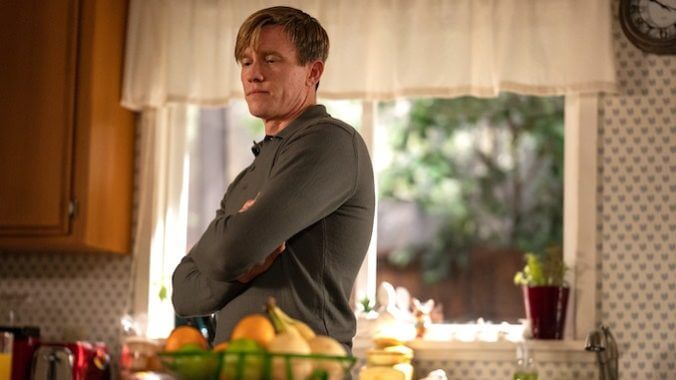In Favor of Yellowjackets’ Jeff and Supporting Deeply Complicated Women
Photo Courtesy of Showtime
In the first season of Yellowjackets, we didn’t immediately warm to Jeff (Warren Kole). It was easy to see him as the deceitful husband, to join Shauna (Melanie Lynskey) in her belief of his betrayal, and share in the justification of her own affair. It wasn’t until Shauna’s confession of murder and adultery that we really began to feel for him. The shocked realization that there was no book club (Season 1’s “Doomcoming”) was a moment of heartfelt comedy gold where audiences saw Jeff for the sweet and naive man that he is.
Jump to Yellowjackets’ sophomore return, and audiences are as loyal to Jeff as we are to the trainwrecks of women that the show focuses on. Much like adult Shauna’s characterization was defined by our introduction to her—masturbating on her daughter’s bed in the pilot episode—our understanding of Jeff is now inseparable from the legendary scene in Season 2’s “Friends, Romans, Countrymen,” where he air drums to Papa Roach’s Last Resort.
This moment comes directly after Shauna finally shows her husband who she really is, or at least part of her, admitting that the idea of him cheating is a turn on. Since then, Jeff has played the supportive husband role in a way that we have never seen before; not only is he responsive to her cuckolding kink (an instant win, as no one should be shamed for their fetishes by their partner), but he is going the extra mile by forgiving her affair and helping to destroy evidence of her murdered lover—which is where most husbands would understandably draw the line.

In this burst of teenage angst, we finally see how Jeff’s really dealing with all of this. It’s clear that while he does everything he can to support Shauna, Jeff is struggling. He is a small-town man, who was always destined to live a simple life, and now he’s having to keep his suburban world from crumbling around him. And yet, he’s up for the challenge.
For a long time, TV dramas have been concerned with damaged men, those who refuse to reckon with their emotions, and instead allow their toxic masculinity to destroy their lives. Sometimes they are paired with equally insufferable women—Mad Men’s chief emotionally illiterate boozehound Don Draper (Jon Hamm) is matched by his toxic wife Betty (January Jones)—but other times, their partners are unfairly painted with the same brush, as in the case of Walter White (Bryan Cranston). Despite him being the meth kingpin of Breaking Bad, it was Skyler (Anna Gunn) who was widely disliked by audiences. Apparently, what’s worse than a drug pushing husband is a wife who’s struggling to cope with it all.
-

-

-

-

-

-

-

-

-

-

-

-

-

-

-

-

-

-

-

-

-

-

-

-

-

-

-

-

-

-

-

-

-

-

-

-

-

-

-

-








































